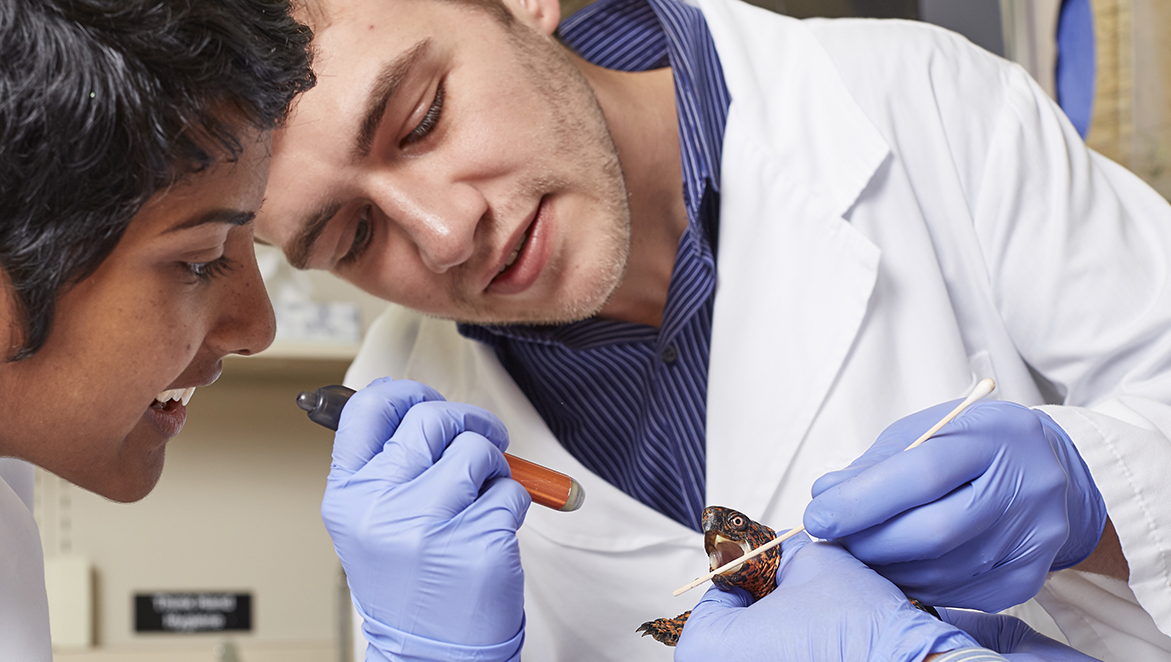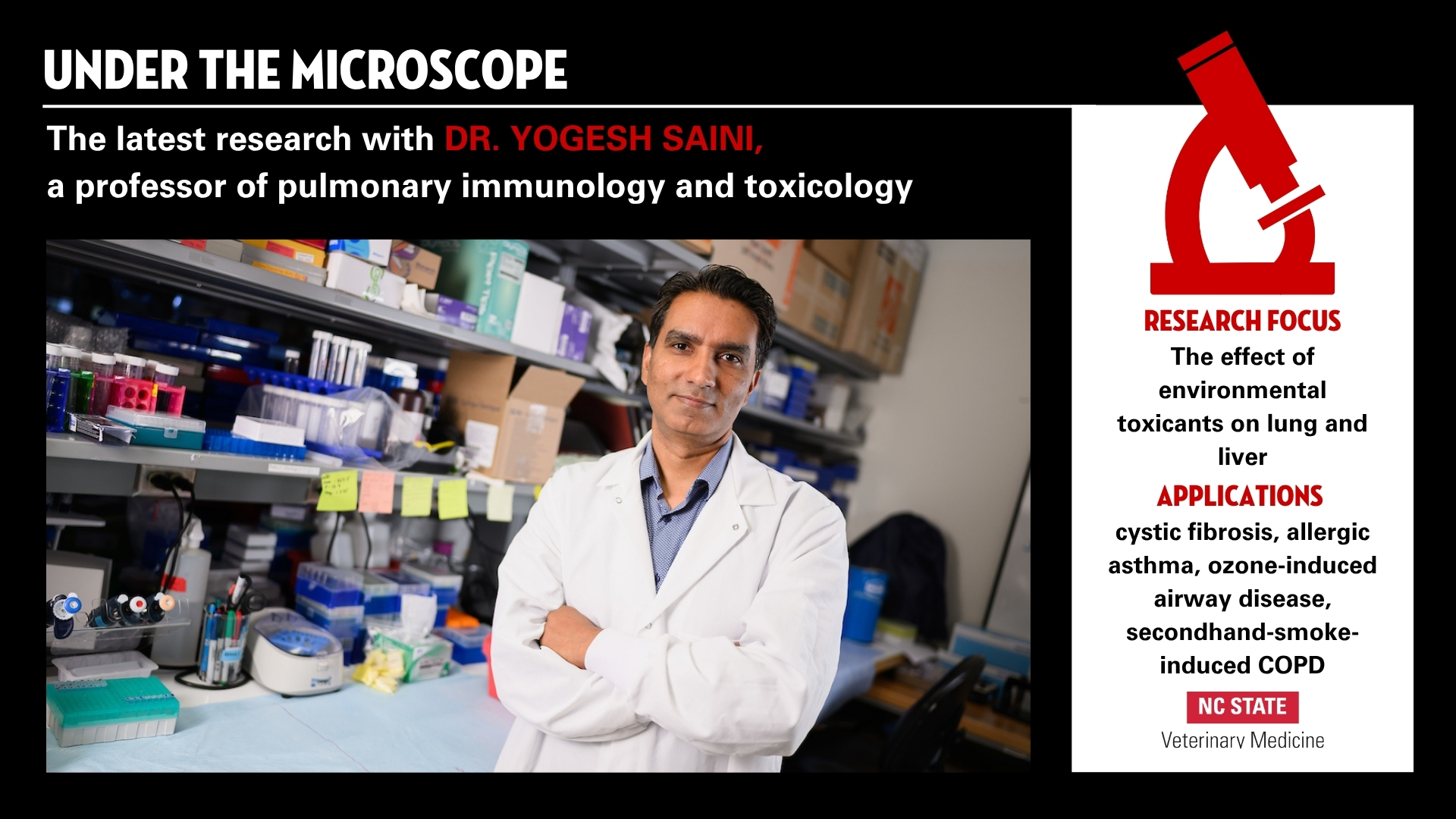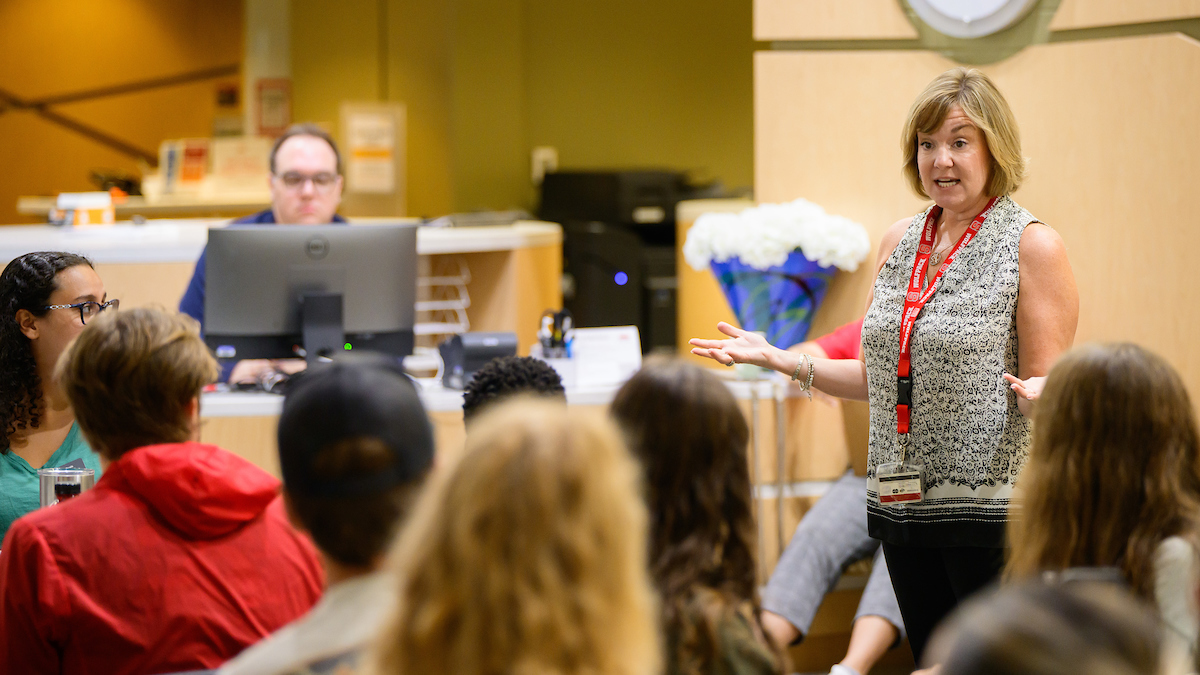6 NC State CVM Students Awarded Hitchings New Investigator Award

The Triangle Community Foundation (TCF) administers the George H. Hitchings New Investigator Award in Health Research. This award is specifically for support of pre-doctoral research and is in the amount of $5,000 for students enrolled and working toward the degree of Doctor of Veterinary Medicine at the NC State College of Veterinary Medicine (CVM). Dr. Hitchings founded the TCF, and in 1989 donated the proceeds from his Nobel Prize in Medicine to help it get started.
This year, six CVM students received awards. All the winning students are on track to graduate in 2018, with the exception of Emily Mackey, who is a combined DVM and Ph.D. student planning to graduate in 2020. The following is a summary of each winning application:
Paige Harrelson
Paige feels a strong personal responsibility to help preserve and protect the natural world. Her involvement with the Turtle Rescue Team for the past four years has given her a passionate interest in improving the outcomes for the approximately 350 sick and injured turtles — including the Eastern Box Turtle, the official North Carolina state reptile — that the team treats each year. Currently, only about half of these turtles survive to return to their homes. As human development continues to encroach on their habitats, leading to many of these injuries, this is a growing problem.
Her Hitchings Award will make it possible for Paige to conduct a summer research project to compare and assess a variety of blood values in the turtles at the time they come in for treatment and again at the time they are released. Understanding these comparisons between sick and recovering freshwater aquatic and terrestrial turtles — and area in which there has been very little prior research — will assist in developing more effective treatment protocols for these animals. Since turtles can live up to 50 years in the wild and reproduce through much of that period, improved treatment can have a significant impact on preserving these populations. Her mentor will be Dr. Gregory Lewbart, Professor of Aquatic, Wildlife and Zoologic Medicine.
John Griffioen
Throughout his higher academic career, John has been the recipient of an impressive variety of awards and scholarships. He is the president of the student-run Turtle Rescue Team at CVM, and his summer research project is an outgrowth of that focus. It has two goals, both intended to improve animal survival:
- Understanding how effectively turtles absorb and metabolize a common class of antibiotics, fluoroquinolones; and
- Use the novel pharmacokinetic technique of non-linear mixed-effects modeling (NLME), which allows for sparser sampling.
Currently, available knowledge about effective treatment for turtles is limited, and this research is intended to advance this area of inquiry and improve outcomes. His mentor for the project will be Dr. Gregory Lewbart, professor of aquatic, wildlife and zoologic medicine.
Esther Gu
Esther already has considerable experience working with animals in clinical and research settings, and her career goal is to focus on research. In the summer of 2015, she did research for Dr. Anthony Blikslager in Raleigh, North Carolina on equine ischemia-reperfusion injury. As an undergraduate, she did research for Dr. Nathan Sutter, of the Cornell University College of Veterinary Medicine, working alone on a project studying equine size genetics.
She has a passionate interest in the impact of improving the health of working animals — horses, donkeys and mules — on the livelihoods of millions of people in the poorest areas of the world, most of whom are subsistence-level farmers. Winning the Hitchings Award brings her closer to her summer research project concerned with equine exertional rhabdomyolysis, a painful and debilitating condition the directly impacts equine health and productivity among the poor. Her planned research will take place in Ethiopia. Supervising her on this project will be her mentor, Dr. Andrew Stringer, clinical assistant professor and director of global health education for the CVM.
Cecilia Kucera
Cecilia has earned multiple academic awards, including membership in Phi Beta Kappa, has spent a great deal of time working and volunteering in veterinary clinics, as well as barns and stables, and is even an accomplished violinist! During her time at CVM she has developed a passionate interest in having a career in teaching and research.
She plans on using her Hitchings Award funds to continue her research into Biomarkers of Intestinal Viability and Patient Survival in Equine Large Colon Volvulus. She and her mentor, Dr. Liara M. Gonzalez, assistant professor of gastroenterology and equine surgery, began in the summer of 2015. The goal of the research is to identify specific biomarkers that can reliably predict the probability of survival for horses undergoing surgery to repair twisted colons that have experienced ischemic injury. Among other things, she will have an opportunity to present her findings to the American College of Veterinary Surgeons annual conference in Seattle, Washington in October.
Emily Mackey
Emily is currently enrolled in the combined DVM/Ph.D., Comparative Biomedical Sciences Program (Immunology Focus.) Emily’s GPA to date is 4.0, ranking her first in a class of 98 students, just one example of her superior accomplishments. She plans on combining her clinical and research training to focus on a career in research.
As a Hitchings winner, she plans to use her award to extend her Summer 2015 research by looking into sex-specific differences in mast cell biology. Her initial research was the first to identify differences between male and female mast cells resulting in a stronger immune system response among females than males, which has an impact on a variety of medical conditions. With her award she will be able to conduct ongoing research into this field, which has ramifications for human as well as animal health. Her research will be jointly sponsored by the CVM and a research laboratory at Michigan State University. Her mentor will be Dr. Samuel Jones, Herbert Benjamin Distinguished Professor and Assistant Head for Equine Programs in the Department of Clinical Sciences.
Kimberly Schreiber
Kimberly has a longstanding interest in large mammals, particularly horses and cattle, with a history of volunteering in a research setting that dates back to high school. While her career goal was initially to be veterinarian practicing in a clinical setting, spending a summer doing bench top research caused her to reconsider, and she now plans to get a Ph.D. along with her DVM to focus on research and teaching.
With her Hitchings award, Ms. Schreiber plans to investigate Salmonella enterica, a disease commonly found in horses and cattle. For humans, it presents a major health concern as non-typhoidal Salmonellae is responsible for 98.3 million cases of gastroenteritis each year. Kimberly has already done specific research on a multicopy single-stranded DNA molecule that appears to play a key role in enabling Salmonella to rapidly colonize the intestine. Because of how common the infection is in food animals, this research is highly relevant to human as well as animal health if it can identify opportunities to inhibit the ability of the organism to populate its host. Her mentor is Dr. Johanna Elfenbein, assistant professor of equine medicine.
These projects being conducted by this group of outstanding students demonstrate the exciting work at the frontiers of animal and human health that takes place at the NC State College of Veterinary Medicine every day.


